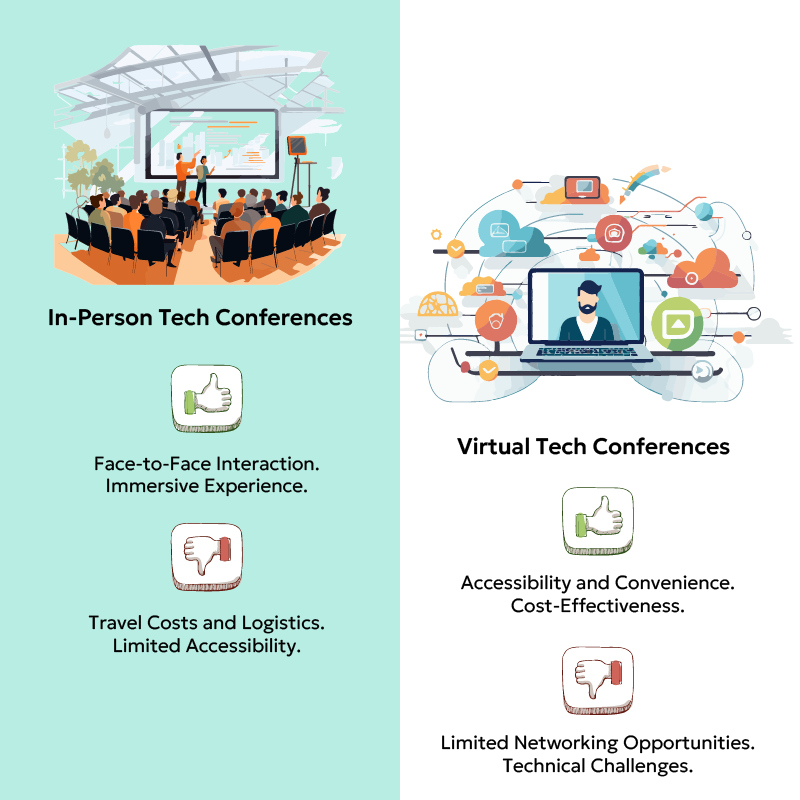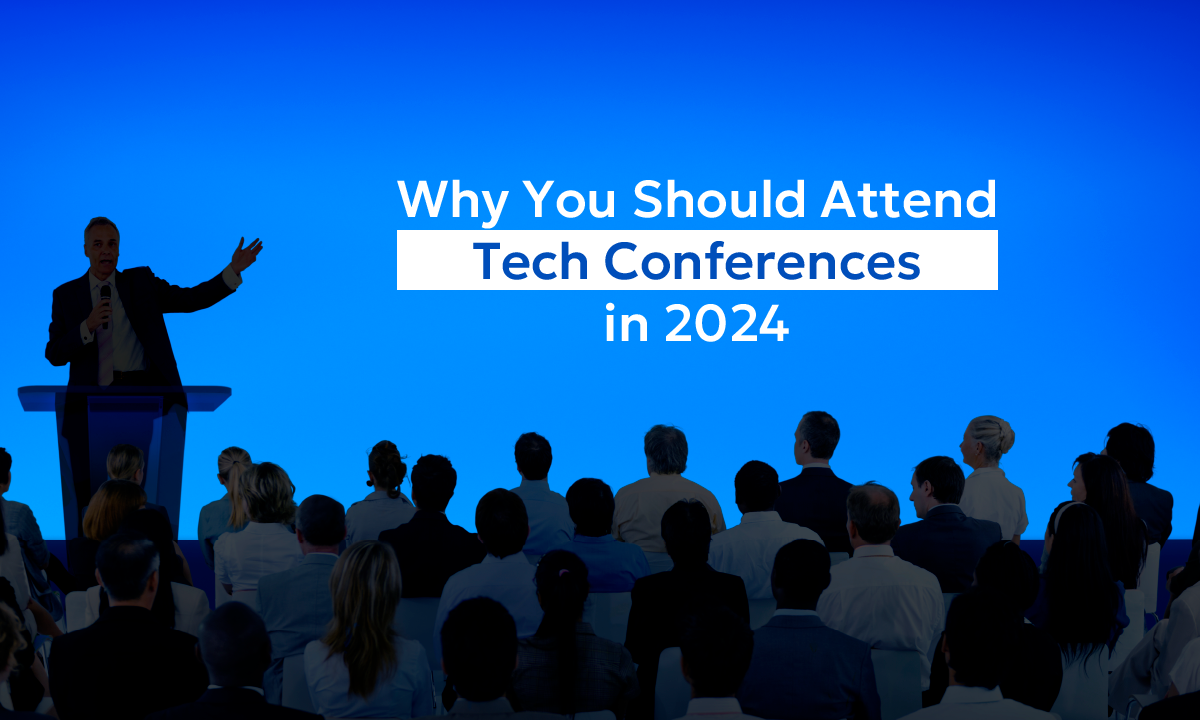The Global events industry is poised to reach $2.1 Trillion USD by 2032, highlighting the enduring significance of conferences in professional realms. In 2024, business leaders and recruiters may find themselves overwhelmed with the endless choices of networking events.
From bustling in-person gatherings to virtual symposiums accessible from the comfort of one’s home, the options are diverse. In this article, we’ll do a rundown of the industry, from the hunt for the perfect event to the strategies for making the most out of attendance.

Join us as we decipher the secrets to finding, navigating, and leveraging tech conferences to propel your organization forward as industry leaders in the technology sector.
The Benefits of Tech Conferences?
With so many options, what defines the cream of the crop of tech conferences? Here, we delve into the key elements that constitute an exceptional tech conference experience.
1. Networking Opportunities
“A good tech conference for recruiters is one that offers a vibrant atmosphere for networking and fostering meaningful connections with top talent,” Says Nancy Sikand, a HR professional for Peterson Technology Partners with over 10 years of Human Resource, Recruiting and Training experience, “It’s not just about the quantity of people, but the chance to connect on a more personal level with potential candidates and industry leaders.”
Tech conferences attract professionals from various industry sectors, providing an unparalleled opportunity to mingle with like-minded individuals, potential collaborators, and even mentors. Whether it’s during breakout sessions, coffee breaks, or evening mixers, these events offer valuable networking opportunities that can lead to new partnerships, job opportunities, or innovative ideas.
2. Access to Industry Experts
Tech conferences provide unparalleled access to industry experts, thought leaders, and influencers who are at the forefront of innovation in their respective fields. Whether they are delivering keynote speeches, leading panel discussions, or participating in networking sessions, these experts offer invaluable industry insights, expertise, and guidance that can enhance your understanding of complex technical concepts and trends.
3. Keeping Up with Trends and Gaining New Perspectives
The tech landscape evolves rapidly with the prevalence of the newest technology trends, tools, and innovations. Conferences serve as hubs for the latest industry insights, allowing attendees to stay ahead of the curve. Panel discussions and workshops offer exclusive insights into emerging technologies, best practices, and market trends that can inform your work and help you remain competitive in your field.
Want to learn more about the latest IT recruiting trends of 2024? Check out this PTP Report article to get the most up to date scoop!
How to find and choose conferences to attend?
1.Industry Research and Recommendations
Nancy Sikand maintains that online tools have exposed her to a wide array of seminars in the past, “In my experience, I find a mix of platforms to be most effective in discovering new tech conferences. While LinkedIn remains a staple for professional networking and event discovery, I also leverage platforms like Meetup and specialized industry forums to uncover niche events and communities. It’s all about casting a wide net to ensure I don’t miss out on any relevant opportunities.”
Whichever platform you use, make sure to conduct thorough industry research to identify reputable workshops and seminars relevant to your company’s goals, industry focus, and target audience. Utilize online resources, industry publications, and professional networks to gather recommendations from peers, industry experts, and thought leaders. Look for conferences with a track record of attracting high-quality speakers, engaging content, and a diverse attendee base.
Pro tip: If you’re new to tech conferences, go to a smaller, local one. Small tech conferences facilitate deeper connections and more focused networking. With fewer attendees, discussions are more intimate and impactful. Starting small allows attendees to engage directly with the content and each other, maximizing the value of their experience.
2. Review Past Attendee Feedback and Reviews
First-hand reviews help recruiters gain new company talent, and it’s no different for a tech conference! Explore feedback and reviews from past attendees to gauge the overall quality and value of potential conferences. Websites, social media platforms, and professional forums often feature discussions and testimonials from attendees sharing their experiences and insights. Pay attention to comments regarding the organization, content relevance, networking opportunities, and overall satisfaction to inform your decision-making process.
3. Evaluate Conference Agenda and Speakers
Review the conference agenda and lineup of speakers to assess the relevance and quality of sessions, workshops, and keynote presentations. Look for conferences that offer a diverse range of topics and formats, catering to different interests and skill levels within your team. Evaluate the credentials and expertise of featured speakers to ensure they align with your company’s interests and objectives. Additionally, prioritize conferences with renowned industry leaders and subject matter experts who can provide valuable insights and perspectives.
4. Consider Budget, Location, and Logistics
Factor in logistical considerations such as budget, location, and scheduling when choosing tech conferences to attend. Evaluate registration fees, travel expenses, accommodation options, and additional costs associated with attendance to determine the overall investment required. Consider the geographical location of the conference venue and its accessibility for your team members. Additionally, assess scheduling conflicts and commitments to ensure attendance aligns with your company’s priorities and availability.
The Rise of Virtual Events

With the advent of digital technology, virtual tech conferences have gained significant traction in modern times, offering unique advantages and challenges compared to traditional in-person events. Let’s take a closer look at the benefits of digital seminars:
Pros
- Accessibility and Global Reach: According to a report by Market Research Future, the global virtual events market reached $774.8 billion in 2023, driven by factors such as increased internet use, rising adoption of smartphones, and growing demand for remote collaboration tools. This accessibility enables greater diversity among attendees and speakers, fostering a more inclusive and globalized tech community. Digital tech conferences break down geographical barriers, allowing attendees from around the world to participate without the need for travel.
- Cost-Effectiveness: Hosting or attending digital tech conferences typically incurs lower costs compared to traditional in-person events. According to a survey by ConferenceMind, 76% of respondents cited cost savings as a primary benefit of virtual conferences, with reduced expenses related to travel, accommodation, venue rental, and catering. This cost-effectiveness makes virtual events an attractive option for organizations looking to maximize their ROI while reaching a broader audience.
- Flexibility and Convenience: Digital tech conferences offer greater flexibility and convenience for both organizers and attendees. With on-demand access to recorded sessions and content, participants can tailor their schedules to accommodate other commitments and time zones. 91% of event organizers reported that the flexibility of virtual events was a significant advantage. Additionally, virtual conferences eliminate the need for extensive planning and logistical arrangements associated with in-person events, streamlining the event management process.
Cons
- Interaction and Engagement Challenges: While virtual tech conferences offer innovative ways to facilitate interaction and engagement, they may face challenges in replicating the spontaneous networking opportunities and interpersonal connections characteristic of in-person events. A survey by Bizzabo showed that 67% of respondents cited lack of networking opportunities as a key drawback of virtual events. Overcoming this limitation requires leveraging interactive features such as live chat, Q&A sessions, virtual exhibitor booths, and networking lounges to foster meaningful connections among attendees.
- Technical Considerations and Accessibility: Digital tech conferences rely heavily on technology infrastructure and internet connectivity, posing potential challenges related to technical glitches, platform compatibility, and accessibility for participants with disabilities. Organizers must invest in robust digital platforms, technical support resources, and accessibility features to ensure a seamless and inclusive virtual experience for all attendees. A report by EventMB revealed that 40% of event organizers considered technical issues as a significant concern when planning virtual events.
Perhaps the greatest takeaway on the debate between Virtual versus In-Person Tech conferences is summed up by Nancy, who recognizes the benefits of each.
“When it comes to the debate between in-person and digital tech conferences, I believe each has its own merits. In-person conferences provide invaluable face-to-face interactions and a palpable energy that’s hard to replicate digitally. On the other hand, digital conferences offer unmatched accessibility and flexibility, making it easier for recruiters to attend and engage remotely.”
Conclusion
As we navigate through the future of technology, it’s evident that tech conferences continue to serve as vital hubs for innovation, collaboration, and knowledge exchange.
“Tech conferences have absolutely transformed my recruiting experience for the better,” Nancy says, “They serve as invaluable platforms for networking, talent sourcing, and brand building. By attending conferences, I’ve been able to forge meaningful connections with candidates and industry professionals, ultimately enhancing our recruitment efforts and positioning our organization as a leader in the field.”
From networking with industry experts to exploring cutting-edge trends and showcasing groundbreaking innovations, these events offer unparalleled opportunities for growth and advancement. By strategically selecting and actively participating in tech conferences, professionals can stay ahead of the curve, forge valuable connections, and contribute to the collective advancement of the industry. Tech conferences will remain indispensable platforms for driving progress, fostering collaboration, and shaping the future of technology.
Looking forward to a career in HR and Recruitment? We’re always looking for the best talent! Visit our job page to find a list of open opportunities to join our growing team.





